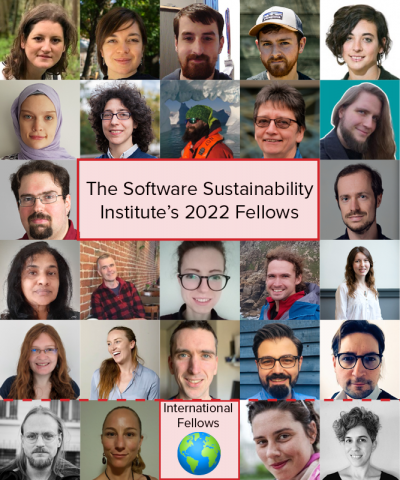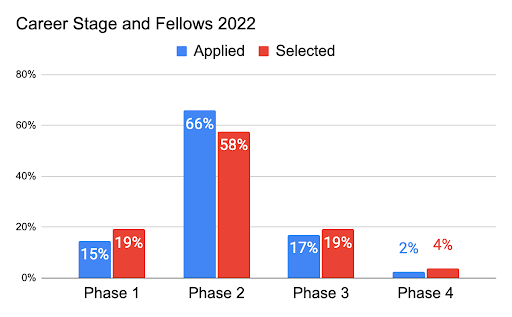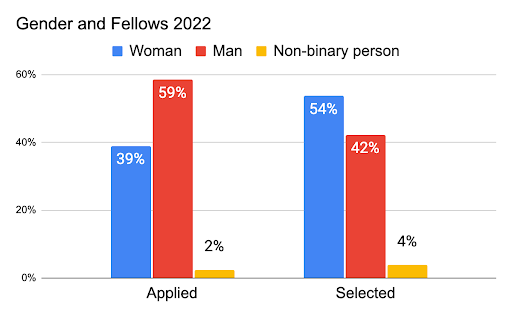Announcing the 2022 Software Sustainability Institute Fellows
Posted on 13 January 2022
Announcing the 2022 Software Sustainability Institute Fellows
 Join us in welcoming the 22 new Software Sustainability Institute Fellows for 2022, plus four International Fellows as part of our International Fellowship pilot! As in previous years, we received many outstanding applications, and our new research software ambassadors represent some of the best people working in – and advocating for – better research software.
Join us in welcoming the 22 new Software Sustainability Institute Fellows for 2022, plus four International Fellows as part of our International Fellowship pilot! As in previous years, we received many outstanding applications, and our new research software ambassadors represent some of the best people working in – and advocating for – better research software.
Due to the continued uncertainty and pressures of the pandemic, we wanted to give back to the research software community by offering more Fellowships than previous years to help support and uplift community members - resulting in 22 Fellows in 2022! In addition, we offered Fellowships to four international applicants (applicants that are based outside the UK or without a formal affiliation with a UK-based institution or office), as part of a pilot to help us identify and address challenges for opening and scaling up the Programme internationally in the future.
Finally, we are also delighted to retroactively name Software Sustainability Institute Special Collaborator Stephan Druskat as a 2018 Fellow! As Stephan is based outside of the UK, the Institute supported him as a Special Collaborator to develop the Citation File Format (CFF), a machine-readable file format for software citation metadata, and run CFF community events. In addition, Stephan played a key role in the formulation of the deRSE - the German Research Software Engineering (RSE) Society based on the RSE Society work taking place in the UK. Under the precedent of the International Fellowship pilot, we are now able to change Stephan’s status to Fellow.
The new Fellows
The 2022 Fellows are: Annie Jeffery, Bastian Greshake Tzovaras (international), Christina Last, Connah Kendrick, David Wilby, Gemma Turon, Georgina Al-Badri, Ginestra Ferraro, James Byrne, Jannetta Steyn, Jesper Dramsch, Kim Martin (international), Luke Abraham, Meag Doherty (international), Mike Walmsley, Nilani Ganeshwaran, Peter Schmidt, Riva Quiroga (international), Sadie Bartholomew, Sam Harrison, Sarah Ames, Sarah Forrester, Sophia Batchelor, Tom Russell, Valentin Danchev and Valerio Maggio.
The new cohort includes representatives from 10 of the research fields in the Joint Academic Coding System (JACS) principle subject codes, including Biological Sciences; Veterinary science, Agriculture and related subjects; Physical Sciences; Mathematical Sciences; Computer Science; Architecture, building and planning; Social Studies; Mass communications and documentation; Linguistics, Classics and related subjects; and Combined/general subject unspecified. The 2022 cohort also includes non-researchers and members of the Research Software Engineering community. Their work is supported by a variety of funders including AHRC, BBSRC, EPSRC, ESRC, NERC, STFC, the Wellcome Trust and local institutional funding.
The 2022 Fellows come from 16 research and technology institutions across the UK, including The Alan Turing Institute, British Antarctic Survey, Ersilia Open Source Initiative, European Centre for Medium-Range Weather Forecasts, King's College London, Manchester Metropolitan University, National Library of Scotland, Newcastle University, UK Centre for Ecology & Hydrology, University College London (3), University of Bristol, University of Cambridge, University of Essex, University of Leeds, University of Manchester (2), University of Oxford, University of Reading, University of Sheffield, and the University of York. The four International Fellows come from the University of Paris in France, Stellenbosch University in South Africa, Pontifical Catholic University in Chile and the National Institutes of Health in the United States.
Many of the Fellows are at an early career stage - they are Research Assistants/Associates, first grant holders, Lecturers and Research Software Engineers. We also have five career Phase 1 Fellows (e.g. Doctoral students), five career Phase 3 Fellows (e.g. Senior Researchers, Senior Lecturers and Senior Research Software Engineers), and one career Phase 4 Fellow (Principal Research Associate) - you can see more about the different career stages and what they mean here. Our applicants come from many different backgrounds and groups, and more than half of the Fellows are women. The charts below provide more information about the distribution of applicants and Fellows based on these demographics.


Please take a look at our Fellows’ profiles. Many of them have provided Twitter handles and other details so you can follow their work and make contact if you share a common interest. You can also meet many of our Fellows at Collaborations Workshop 2022 taking place 4-7 April (registration is open via Eventbrite).
You can find further information about the Fellowship Programme here and sign up to this mailing list to receive updates about the programme such as when applications for the 2023 cohort open.
Congratulations and welcome again to the 2022 cohort!
